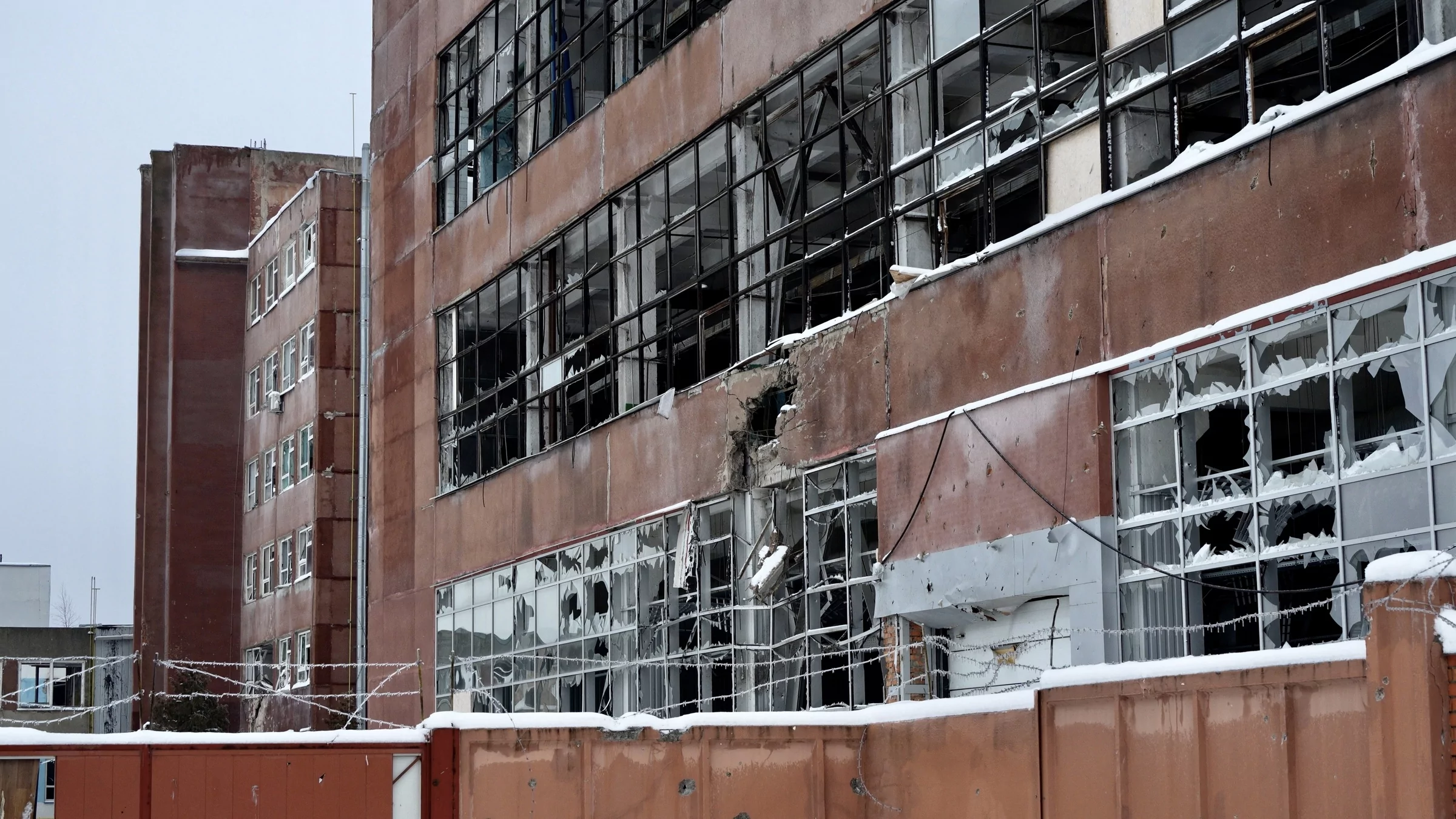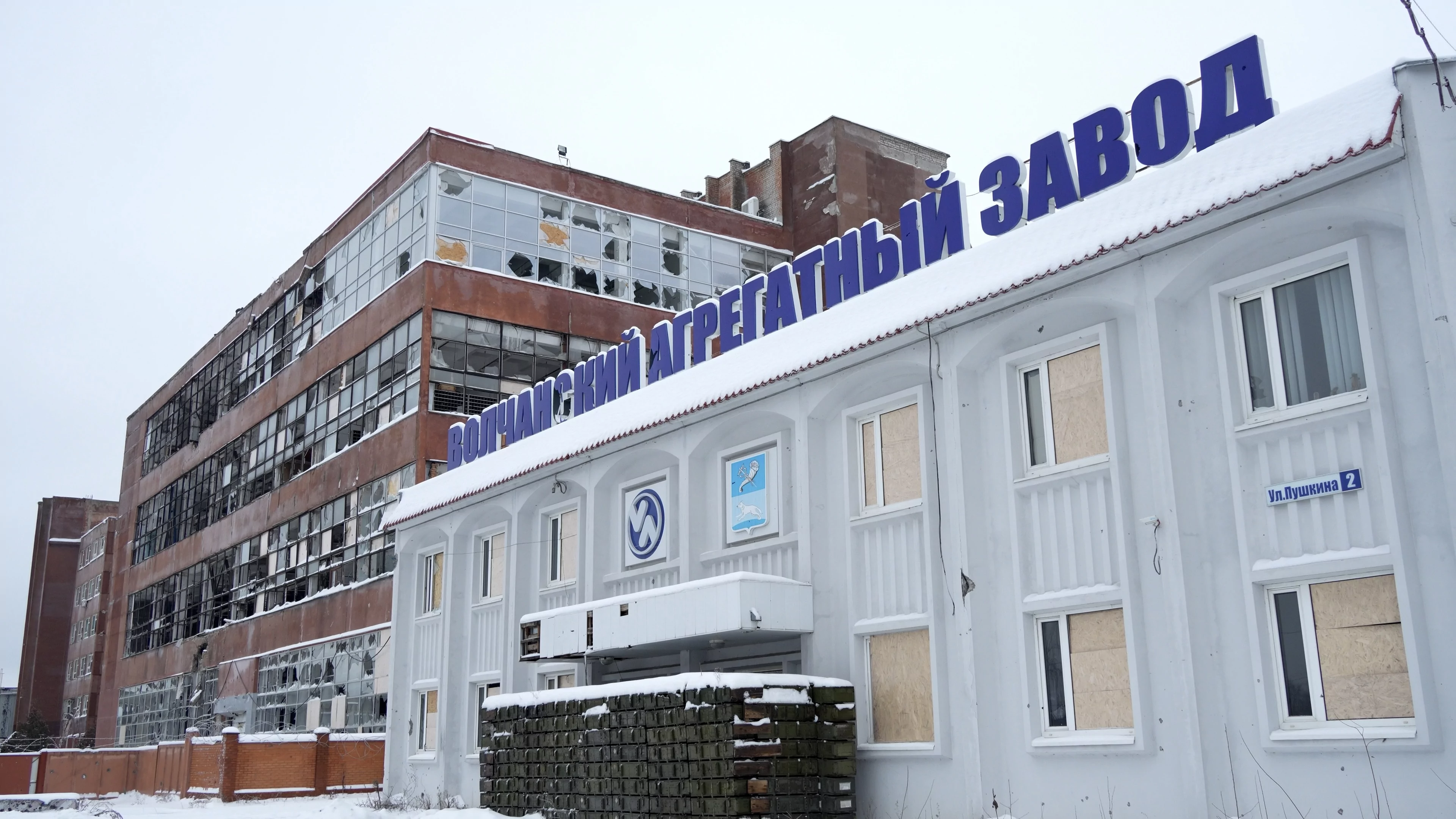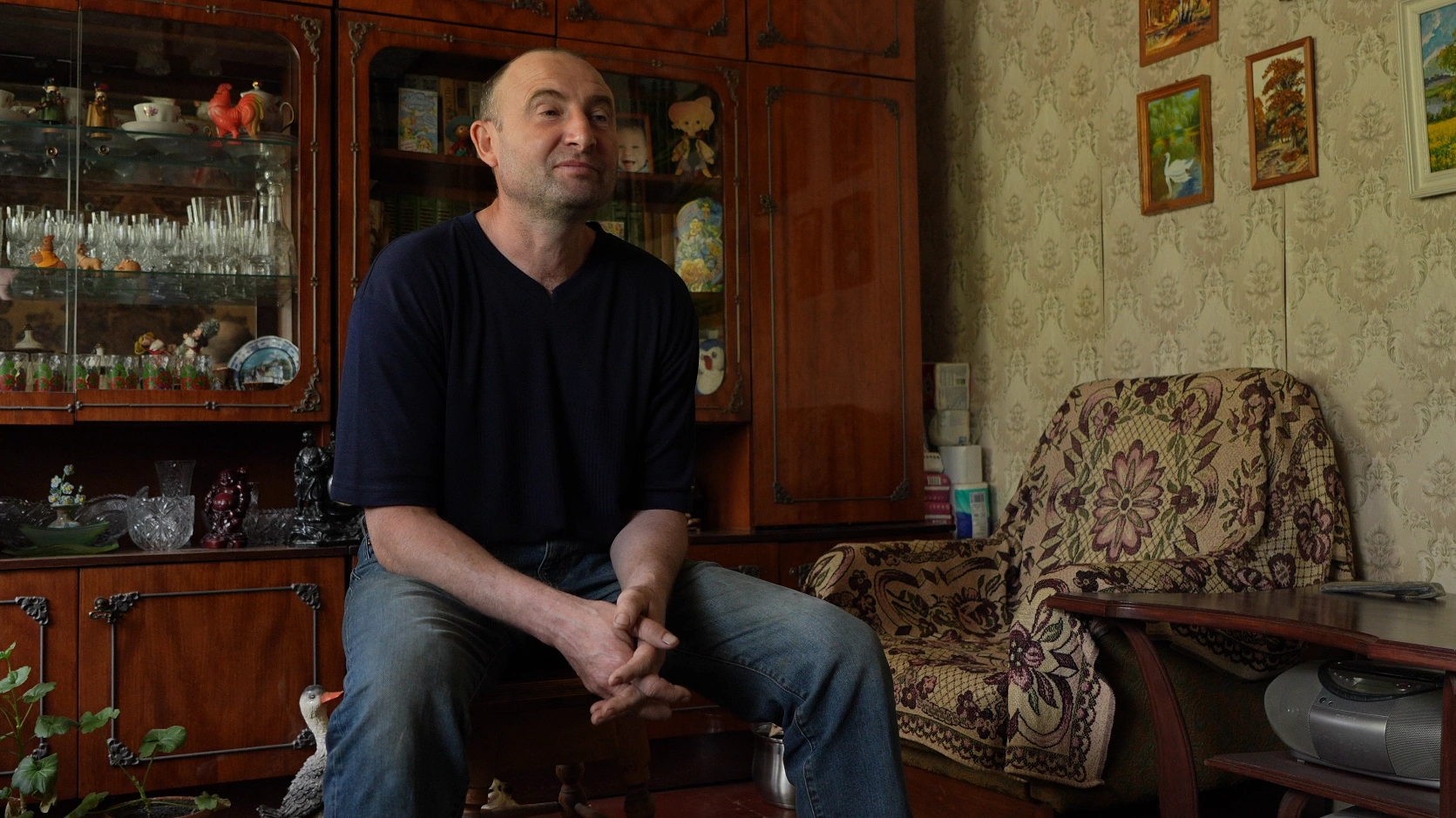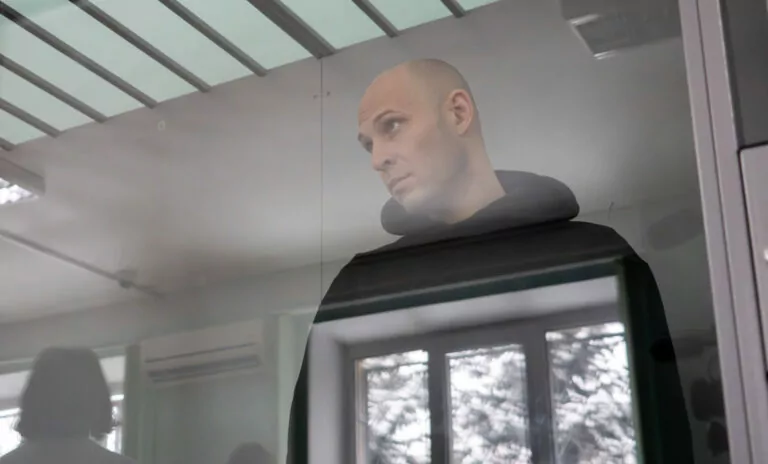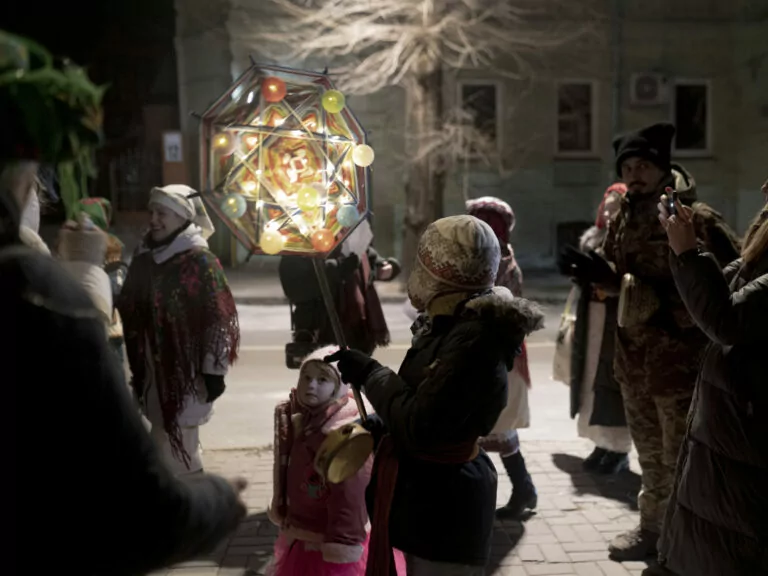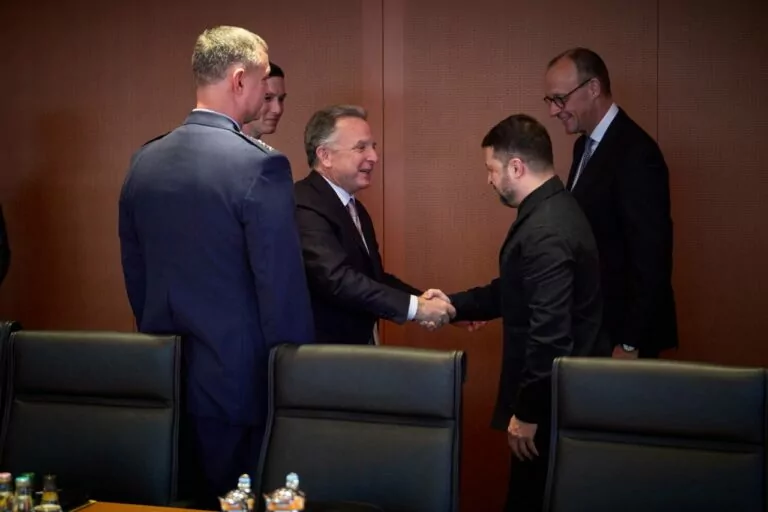The Russian military occupied the north of Kharkiv oblast on the first day of the full-scale invasion in 2022. For the next half a year, these territories were occupied. During this time, Russians organized a torture facility in the aggregate plant in Vovchansk: they detained and interrogated locals there. Roman and Viktor, school teachers, were among them.
After the deoccupation of Kharkiv’s northern territories in the autumn of 2022, Ukraine’s Security Service (SBU) documented war crimes the Russian army committed on the plant. Gwara Media contacted investigators to document the evidence of torture on the Vovchansk aggregate plant but didn’t get clearance and permission to film.
Still, our journalist Vika Mankovska talked to Roman and Viktor, physical education teachers from the Kharkiv region, and wrote down their experiences on the Vovchansk aggregate plant under Russian occupation. The text below is written from their accounts of detention, abuse, and torture on the plant, as well as forced labour they endured in Russian captivity.
Russians take down the Ukrainian flag
On February 24, 2022, Roman woke up at 5 a.m. He looked out of the window and saw columns of Ukrainian border guards moving towards Kharkiv. The cars with “Z” on them followed. On the first day of the full-scale invasion, Russians forced the employees of the local administration in the village Roman lived in to give them the documents and take down the Ukrainian flag from the council building.
At the beginning of April, the Russian military started to check residents. Locals recall that Russian soldiers searched for Ukrainian soldiers and their relatives following the lists of veterans they had in their possession. Later, they checked those who “threaten the regime,” meaning “saboteurs” and people with pro-Ukrainian views. Roman was among them.
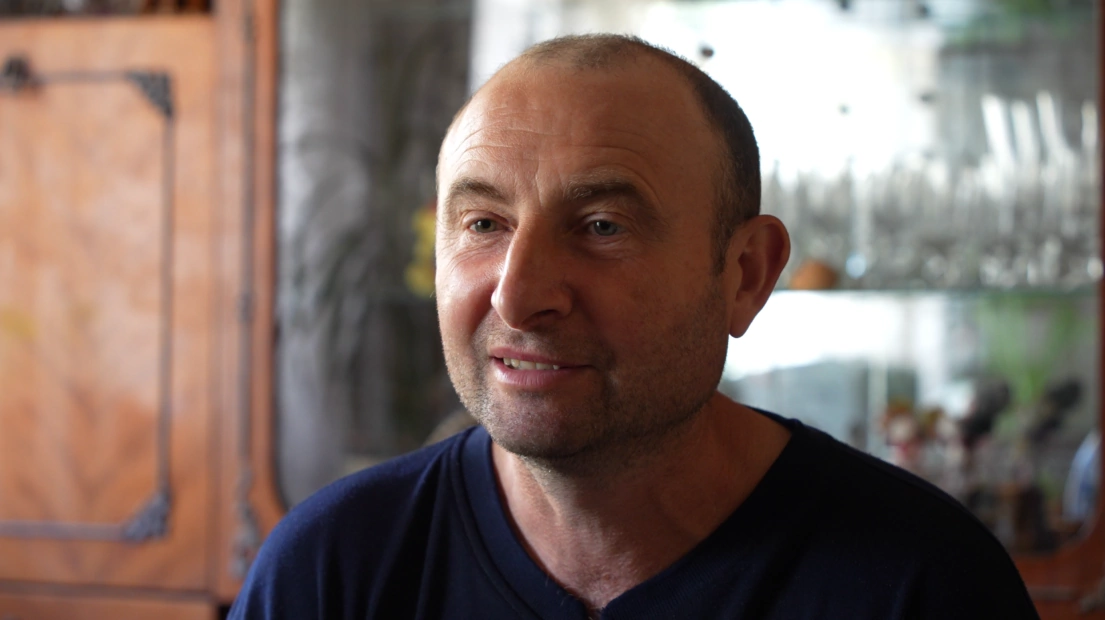
Russians come in on the armored vehicle
In April, the village community started to whisper that Russians detained and interrogated not only war veterans but also people with pro-Ukrainian views. Before he was taken prisoner, a friend said to Roman, “I think, we’re going to be taken into the torture chamber.” Even though since 2014, Roman’s had clear pro-Ukrainian views, that day, he confidently responded to his friend, “Don’t exaggerate, they won’t take us.”
On April 22, around 6 a.m., Roman woke up to the sound of the bolt on his gate falling down. Peeking out of the window, he saw the armored vechile Ural equipped with a large-caliber machine gun. Soon, he heard knocking, and shouted, “Don’t break the gate, I’m coming!”
Roman quickly put on a t-shirt and pants and went to the door. He had to act quickly because the people behind the gates and the machine gun behind their backs weren’t known for their patience. As soon as he opened the gate, he raised his hands in the air. Three red dots from the machine gun’s sights appeared on his t-shirt. Three Russian soldiers stood near Ural, covering themselves with shields.
“Anyone else home?” one asked, in Russian.
“Parents,” Roman answered, in Ukrainian.
“Call them,” barked the same one.
Roman got back into the house to wake the parents up. “Don’t be nervous, gather up and go outside.” A few minutes later, an order came from the street: “Get outside!”
Roman left the house and sat on the bench while Russians were pointing their firearms at him from behind their shields.
In a few minutes, Roman’s parents also walked outside and sat behind their son on the bench. Russians addressed Roman, “Lead us inside.” The man stood up and slowly went to the house’s doors, followed by three soldiers.
They searched through every room in the house, one by one. After they went through the last one, Roman heard the “All clear!” He was led outside, but the search wasn’t concluded at that. Another three men passed through the gate. One of them carried a quadrocopter. They put a drone in the air and, for half an hour, scouted the location around the house. Sometime after, Roman heard a familiar “Clear!” The man has never found out what they’ve been looking for in the house
Next, an “intelligently looking man” in balaklava [headgear that exposes only eyes and mouth — ed.] passed into the yard. He asked for Roman’s phone and asked, “Any friends in the military or in the organs? [police/SBU/special services — ed.]”
“An acquaintance in SBU, and my brother is in the military,” Roman said, not hiding anything.
He was sat on the bench again. Another group came to his yard to conduct another search. They were snooping around for about an hour while Roman and his parents waited on the bench. When they were finished, their only words were, “Get your passport, you’re coming with us.”
April 2022 was cold. Roman took as many clothes as he could along with his documents. He was going to be detained, he understood. If or when he would return home, though, was unknown.
Roman’s hands were bound in front of him. Russians pulled his hat onto his face and sat him down into “Ural.” The man understood they were taking him to the aggregate plant in Vovchansk. The neighbors told him that Russians took “everyone they wanted to talk more” there.
They sat in the car in silence for a few minutes. Only when they got to the plant, Russian soldiers said, “See, you got here safe and sound. Why do you hate us so much?”
“Because you’ve been killing us for years. Millions died of starvation: in 1927, 1933, and 1947,” a voice near Roman said [the years referenced are instances of famine in Ukraine under the Russian/Soviet rule; 1932-1933 is years of Holodomor, a man-made famine, organized and enforced by Soviet government in Ukraine, which Ukraine and 33 UN member countries recognize as an act of genocide — ed].
“Hunger was in Tambov Oblast too,” the soldier said.
“In 1933, you weren’t starving. Your country has been killing Ukrainians for years,” the voice responded.
Roman heard two dull sounds of someone being hit with gunstock, followed by the words.
“We’ll talk in the other place. We’ll see how brave you are.”
Roman recognized the one who answered a Russian soldier. It belonged to his teacher and a friend, Viktor. It was he who said, “I think, we’re going to be taken into the torture chamber.”
He was not wrong.
Russians don’t allow families to say goodbye
April 22 is the anniversary of Viktor’s brother’s death in Afghanistan. In 2022, it’s been 38 years since his death. Viktor remembered the date well—every year at this time, he thought of his brother and honored his memory. But that day began differently. In the morning, Viktor and his wife have been woken up by dog’s barking. The man got up because somebody was knocking on his gates.
Russian military followed the same plan everywhere: they got into his yard, pointed guns at him, and started the search.
The man with the sign “FSB” [FSB (or Federal Security Service) is Russian main security agency — ed.] on the back pushed Viktor towards the door of the house and asked if he had weapons. He had two biathlon rifles in the house, and the Russian forced Viktor to show them. An unknown man opened the case, but the Russian waved it off, “We aren’t interested in weapons like that.”
Occupiers checked every room and led Viktor into the yard. One soldier stayed with his wife in the house.
“It’s done, dress, and let’s go,” Russian responded.
When Viktor got dressed, the soldiers bound his hands with the tape and pulled his hat down onto his face.
“Can I say goodbye to my wife?” Viktor asked.
“You can’t,” a Russian responded, leading him to “Ural.”
A few minutes later, “Ural” stopped, and Viktor felt someone being sat beside him. It was Roman. Then, the argument with Russian soldiers and pain from the beating. After that, Viktor hasn’t spoken to Russian soldiers until they reached their destination.
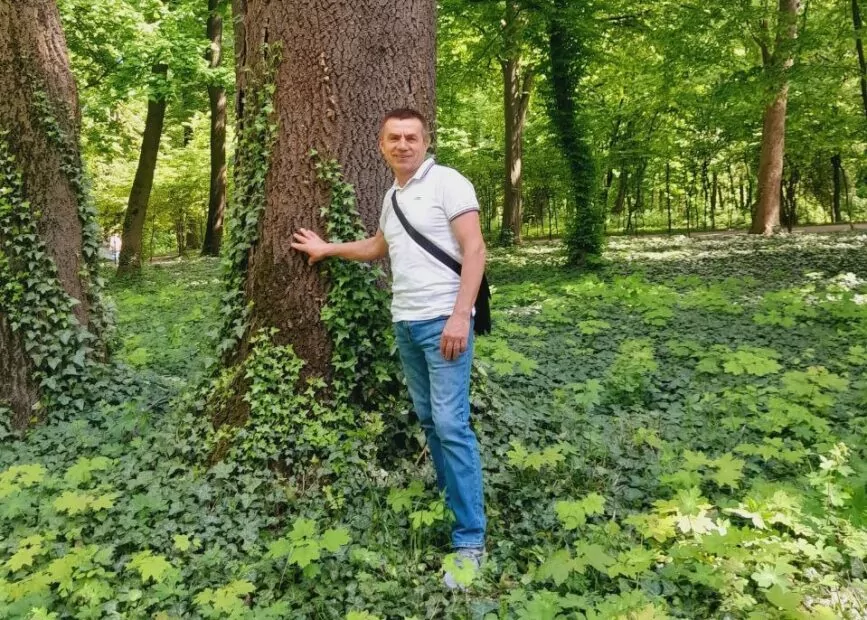
Russians abduct people
As soon as the car stopped, Roman was taken under the arms by two soldiers and led to the stairs towards the aggregate plant. They passed a few halls before Roman and the other prisoner were sat down on the bench. The hat’s see-through fabric allowed Roman to see a lady’s shoes on the legs of the prisoner beside him.
In a minute, the doors the prisoner faced opened. A tall man in a military uniform walked out. He called for the first prisoner, and the prisoner in the woman’s shoes stood up from the bench. Roman recognized the voice of Nina Hryhorivna, a local school director.
He heard the steps coming from the direction Roman himself had been brought here. From the darkness, a soldier came closer to the prisoners and addressed one of them.
“I can’t start the car.”
“It has an anti-hijacking tumbler. Click it, and it’ll start,” Roman recognized this voice, too. It belonged to his neighbor, Valentin.
That day, four people were taken from his village. Roman recognized all of them.
Russians torture civilians in Vovchansk
A woman was led out of the office and sat beside Viktor. He heard an order from the side, “Bring that one in.”
He was led to the office, sat on the chair. His captors used tape to bind his legs to the chair and left his hands bound behind his back. Viktor thought the occupiers would ask him questions — until the moment they started beating him.
At first, they were beating him with something heavy. Viktor thought, “I hope they won’t beat me so hard that I’ll lose my teeth, what would I do without them?” They hit his ribs, neck, and legs. Left bruises on his entire body.
After the third hit, Viktor screamed for the soldiers to stop, but they continued beating him. Then the soldier Viktor named “Colonel” in his mind said, “That’s enough. I think he’s ready to speak.”
The first question was, “Who do you work with? Who are your subordinates?”
“What do you mean, subordinates?”
“We know you are the leader of a sabotage-reconnaisance group?”
“What leader? I am a trainer and a school teacher.”
“We have received information that you often climbed the tree near the river and sent out messages using your mobile phone.”
Viktor understood that someone fro the locals reported him.
“I repeat once again: who are your subordinates?” a soldier asked, annoyed.
“No one, I’m just a teacher,” Viktor responded.
Soldiers started beating him again.
“We know you tought children. We have lists of your colleagues. You went every month to the Western Ukraine and received assignments there.”
“Colonel” read from the notebook. Each month, Viktor accompanied the kids he trained in Kharkiv Oblast to various sports competitions. But he wasn’t involved with special services and didn’t receive any assignments from them.
Russian soldiers didn’t believe his words and continued the interrogation.
“I see you aren’t one for talking.”
Viktor’s hands were moistened with some liquid to find the remnants of gunpowder.
“Are you a sniper?”
“No, I trained biathletes.”
Soldiers checked his fingers. Moistened the tips of Viktor’s ears and put clips onto them. From the left side, the man heard the order, “Go.”
Viktor felt his ear burn from the powerful electrical shock. The more he was being silent, the stronger the electricity charge was. Viktor started to scream, but, in a few seconds, he heard the next order, “Bring it down.”
“Are you going to talk?” “Colonel” asked.
“I don’t know anything. What can I tell you?” Viktor responded.
“Then, we keep going.”
The man was tortured with electricity so hard he started to lose conciousness. He didn’t understand where he was and what was happening. When soldiers noticed that Viktor started to lean forward, an order beside him said, “That’s enough, we’ll continue tomorrow.”
Soldiers cut the tape on Viktor’s legs, held him up and led to the exit from the office. For some time, he couldn’t move his legs because of the beating, and couldn’t move his head because of electrical shock.
The man was led outside so he could breathe fresh air. In a minute, he was asked, “Can you walk by yourself?” Viktor did, and was led, with his hands still behind his back, into the halls of the aggregate plant.
“Don’t wriggle too much,” Viktor heard from the side, even though he only had the strength to slowly walk to his cell.
He was led to the stuffy dark room and ordered to take out his shoelaces from his sneakers. He still had his hat on his head, stretched over his eyes. A soldier who sat behind the desk at the end of the hall asked, “Name, surname? What are your charges?”
“I don’t know.”
“Everyone says that.”
The soldier who brought Viktor said, “It’s the leader of a sabotage group. He and his wife screamed in the shop, “Glory to Ukraine! Bandera is our hero!”
Viktor protested, “My wife has nothing to do with that.” Viktor didn’t scream any of that in the shop but thought his wife could have.
During the interrogation, Viktor was also told, “We’ll take your wife, and then you’ll get talkative. We’ll throw her to the guys’ room. You know what they’ll do, so speak.”
Viktor tried to protect her, “Don’t touch my wife, it was I who screamed in the shop!”
After Viktor came back from the aggregate plant, his wife scolded him for doing that because it was neighbours’ slander or occupiers’ manipulation. But, at that moment, Viktor was willing to say anything so that Russian soldiers didn’t come for his wife during the night.
Cell gates clacked and Viktor was pushed inside it, the tape on his hands cut. In the darkness, orienting himself by touch, he reached the wall and leaned his back on it. Viktor asked if anyone was in the room, but received no answer. All that was left to do was wait.
He can’t remember how much time passed before the cell was opened again and someone else came in. He heard Roman’s voice near the gates, “Fedorovich, are you here? Why are you in the hat? Let me help you take it off.”
“Where are we? Is it the police [department]?” Viktor asked when Roman came closer. It occurred that the gates are doors with the bars. A soldier on duty with a gun patrolled behind them, and another was writing something sitting at his desk.
“Have you not gotten it yet? We are on the aggregate plant.”
Russians are beating prisoners up
Roman was made to sit on a chair in the office. Soldiers clasped two clips on his earlobes. One of them pressed a button on the control panel and Roman felt an unpleasant tingling sensation but tried not to react to it. Tingling continued for five minutes as the soldiers slowly increased the voltage.
“Look, he doesn’t react,” a soldier said.
“What do you want from me?” Roman asked.
“Colonel” sat in front of him and said, “Walkie-talkie was found in your house during the search.”
“Where? Show me! I don’t have anything,” Roman cried.
“You’re so smart, aren’t you?”
A telescopic antenna was installed on top of Roman’s house. Occupiers mistook it for an antenna for transmission of radiomessages. They continued interrogating the man and when he didn’t answer their questions, they hit him with an electrical shock.
“Have you served?” A soldier asked again.
“No, I got burnt when I was eight and didn’t serve. If you want, pull up the archives and check,” Roman said.
“I have flat feet but I serve,” the other soldier commented.
“That’s rough,” Roman responded drily, and was hit again with the gunstock.
Roman named this method of beating “star method”: when they got “wrong” responses to their questions they beat his shins, then his shoulders, then hit at his chest.
After the interrogation was over, Roman was led out of the office and sat down on the bench. The soldier from Russian-occupied Luhansk offered him two options. First, a “constructive” conversation with a cup of coffee; the second, a “much worse” one. Roman laughed at the offer, but the combatant hit his thigh with a baton once again, “That’s funny, fag**ot?”
Russians are keeping people in cells
The guard pushed Roman inside a 4 by 9 meter cell, shouting for other soldiers, “Meet this damn rooster f*g [“петушара,” a derogatory Russian slur for homosexual men, often used in prisons and places of detention — ed.].” The first thing Roman noted is an ever-present smell of urine and cigarette smoke.
After 20 minutes, a combatant shouted that workers are needed on the floor. Roman’s hat got stretched onto his face again. He was led to sweep the floors in the hall. When they got him back, Viktor was already in the room where Roman will live for the next few weeks.
Roman and Viktor sat together for two or three hours, and then other prisoners came back from “work”: “Newcomers, find places for yourself.”
Mattresses could fit only 15 people. The rest had to sleep on the floor.
The biggest number of prisoners that were simultaneously determined in this cell was 38. Roman and Viktor slept head-to-toe on the floor for four nights to preserve warmth. Youngest prisoners usually gave up their spots to senior men. Viktor and Roman both recall that the bruises and hematomas left in the wake of interrogations complicated the sleep the most.
One of the prisoners was a man who Roman and Viktor called “a millionaire from Kharkiv.” At some point, he asked Viktor, “Did you see where these mattresses came from?”
“No, I wasn’t curious.”
“Look here,” Millioner pointed Viktor at the label, where he saw a label from STD and dermatology dispensery [“кожвендиспансер” — ed.]
Men thought that the occupiers wanted to infect prisoners with illnesses from the dispensary but didn’t pay it any mind. The only thing they wanted was not to sleep on the floor.
Mostly, veterans, drunk ruffians, and people with drug addiction have been detained in the cells. Roman recalls a man who drove his car right into the Russian checkpoint. He entered the cell with a shout, “Take my woman, give my motorbike back!” Other prisoners called him a Racer. Roman also recalls “Andriuha,” who Russians made to peel off a swastika tattoo with a stone.
One 18-year-old boy was detained in the cell for a week. He was detained because he was helping a drunk relative get home. Another 70-year-old was detained for drinking alcohol. Roman says Russians needed a free labour. That’s why they used different reasons to take people to aggregate plant: violation of a curfew, drinking, neighbors’ defaming reports. But every prisoner was asked the same question, “Where are the atovtsi?” [atovtsi from ATO (Anti-Terrorist Operation), veterans or soldiers who fought in Russian-Ukrainian war before the Russian full-scale invasion — ed.]
There have been three rooms for prisoner detention. On the third floor and in the half-basement room, Russians detained men. Women were detained on the third floor.
The hours without electricity were exhausting, so prisoners asked to be led outside to work. That became a “reward” of sorts, working outside, because the more people got detained, the harder it was to breathe in that cell. The prisoners have been developing allergies because of the dust.
There was no electricity in the first week of Viktor and Roman’s captivity, but then [their captors] started switching it on at 6 o’clock in the morning and switching it off at 10 o’clock in the evening. When the light appeared for the first time, the prisoners asked for a bucket of water and a rug, to wash the floors twice during the day.
Occupiers gave each prisoner a nickname based on the reason they’ve been taken into captivity. In their journal, Viktor was identified as “Teacher Glory to Ukraine” and Roman as “Navigator” [Roman’s brother served in the Ukrainian fleet — ed.]
The prisoners were fed twice per day. People who have been taken prisoner after Viktor and Roman told them, “You got lucky, the prisoners after you have been basically starved.”
The captives connect it with the fact that the occupiers got furious. In April 2022, they’d still been sure that they would take Kharkiv. After Ukraine launched a counteroffensive in September 2022, they got less sure. When the Ukrainian army pushed the occupiers away from Kharkiv, they got really angry.
Russians use POWs as free labour
In the first week, Roman and Viktor cleaned up cigarette butts from the territory of the plant. Everyone, even people with mobility issues, had to work. Then, prisoners dug up holes for mortars for soldiers and casspools for street toilets.
After Ukrainian army deoccupied Staryi Saltiv in May of 2022 year, prisoners spent 12 hours per day digging trenches around Vovchansk aggregate plant and beyond it. Roman recalls that before May they weren’t forced to dig trenches because of their status: they were so-called “political prisoners,” which supposedly softened their “punishment.” Later the situation changed because Russian army needed to fortify their positions in the city as quickly as possible.
Before the captivity, Roman’s weight was 72 kilograms—after, his weight was 60 kg. During the first two weeks of captivity, Viktor aged, got thinner, and his hair grayed. Roman laughed at him, not unkindly, when prisoners were led to work in the warehouse, “Who is that old man in the car with us? Fedorovysh, is that you?”
At home, Viktor got used to showering twice per day, and in captivity the familiar rituals became impossible. One time, when prisoners were led out to dig, Russians washed their armored personnel carriers on the street. Viktor asked to stand under the water from the hose. Despite the cold weather, even freezing water was better than the lack of a shower.
The canteen where Viktor soon started working had a shower, which also became a “reward for hard work.” “If you work well, perhaps we’ll allow you to wash up,” Russian soldiers said. For the first few days, a guard surveiled the prisoners, but after the warning that the attempts to flee will be punished with beating or execution, the supervision stopped.
For a few times, the prisoners were ordered to stand in a row while Russians announced so-called “amnesty.” Most often, the “amnesty” happened on the holidays, Easter or International Labor Day. These days, they were releasing ten people at once from captivity.
Viktor asked the occupiers when he would be released. They responded with, “Sorry, teacher, but you aren’t ours. You are under FSB’s control.”
Russians abuse prisoners of war
Former captives say they were held prisoners by Russian FSB employees, so-called “Luhansk police officers,” and special forces from Luhansk. They called themsevels “intelligene operatives” [розвідники, rozvedchiki — ed.], but mostly they interrogated the prisoners. They often demanded money from farmers, business owners, people with drug addiction.
Sometimes, Russian soldiers organized “show beatings”: they beat up men in front of the cell and made sure other prisoners watched. Sometimes, they made prisoners sit on the chair in front of the cell, with their legs crossed, and left them sitting there for several hours or entire night.
Viktor says that the occupiers beat up some people, and then led them in an unknown direction. No one has seen those prisoners anymore.
He also recalls when the occupiers got drunk and decided to have fun. Several drunk soldiers opened a door to the cell and asked, “Who’s charged for what?”
They picked a man who got imprisoned for doing drugs and started beating him right in the call. Luhansk special forces ran out from the nearby office, shouting, “Who allowed you to beat up the prisoners?”
“I am a leutenant, I have the right to,” a drunk soldier responded.
They picked up the beaten man and pushed him back into the cell, closed the door. The prisoners haven’t heard what happened in the hall, but next day they found out that the organizers of a show beating have been stripped of their rank and sent to the occupied Luhansk. When prisoners came to the canteen, soldiers told them, “No one will bother you anymore.” No one really had.
The other time, a drunk soldier from occupied Luhansk came to the prisoners and forced them to learn an anthem of “LNR” [“LNR” or “Luhansk People’s Republic” is how Russian militant proxies in Russian-occupied territories of Luhansk Oblast call the said territories — ed.].
In the cell, Viktor got acuantained to a smuggler Andrii, who said, “If I get out earlier, I’ll try to get you and your wife out.” Viktor later found out that Andrii paid to get free from the captivity, so he was allowed to flee.
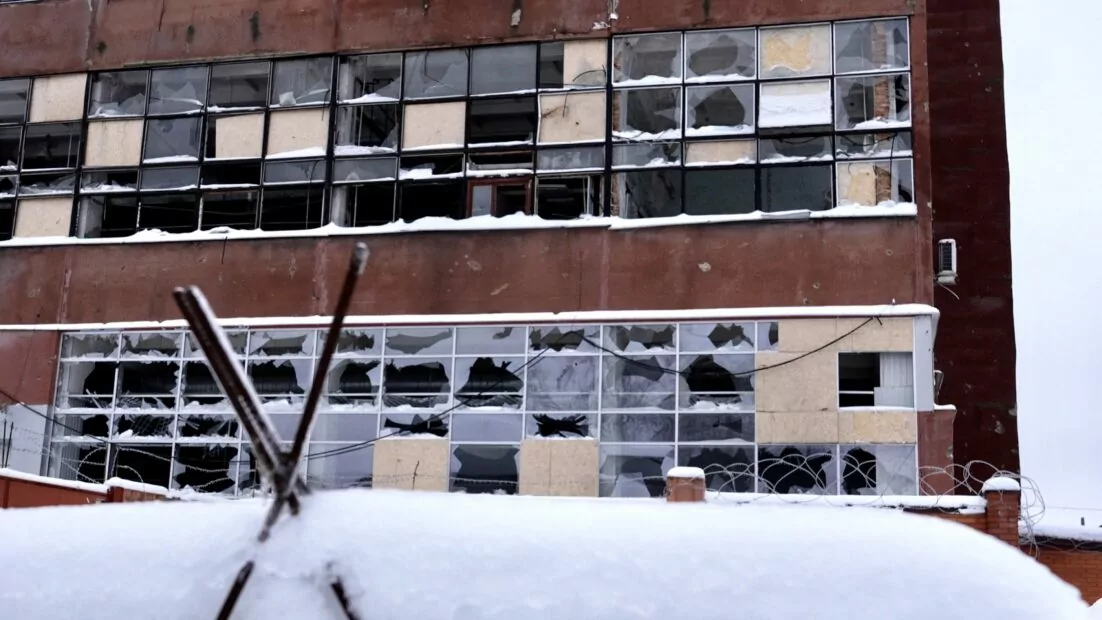
Ukraine returns the flag
On May 10, 2022, “Colonel” entered the cell and called for Viktor’s surname. Viktor responded and heard long-awaited, “Take your staff and go.” Andrii came to Viktor and whispered, “Take your wife and run, because after May 15, there’ll be a rotation. If you don’t flee, you won’t be able to leave here.” Along with Viktor, another seven people have been let go, including Roman. They walked for about 10 kilometers to their village. Sometimes, they ran to get home faster.
In a few days, Viktor and his wife left to go to Lviv Oblast, and Roman stayed in his village.
On September 10, 2022, Roman worked in the vegetable garden when he heard the scream, “Romka, they are running!” His neighbour has just returned from a checkpoint, abandoned by Russian troops.
On Saturday, it was quiet during the day. Roman ran to his friend and saw the last car with “Z” leaving, stuffed full with the stolen things. Roman decided that it’s necessary to return the Ukrainian flag to the village — with his neighbor, they hung it back on the building of their village administration.
That day, military vehicles with the same flag, blue and yellow, entered the village.
Vovchansk aggregate plant has been captured by Russians again after they launched a new ground offensive from the north of Kharkiv Oblast in May, 2024. After months of fierce battles for the plant, Ukrainian intelligence units managed to push them out of the plant on September 24, 2024.
As it was mentioned, before this Russian offensive, the aggregate plant hadn’t been accessible for journalists of Gwara Media, and we weren’t able to investigate its interior. At the time of publishing the translated version of this article, the state of evidence of war crimes Russians have committed on the plant in 2022 is unknown. Kyiv reports the plant is currently under control of the Ukrainian military.
Author: Vika Mankovska (original in Ukrainian)
UPD from October 28, 6:32 p.m.: Mistransliteration fixed — Viktor, not Victor is a correct spelling of a man’s name.
Hi! It’s Yana Sliemzina. I’ve translated this article and adapted it for English-speaking audiences. Thank you for reading—I hope Vika’s work and Roman and Viktor’s stories will make more people more aware of the atrocities Russia commits in occupied regions of Ukraine. Please, consider also supporting the efforts of our Kharkiv-based newsroom to cover Russian war crimes in Ukraine and Kharkiv Oblast on Patreon, BMC, or PayPal.

